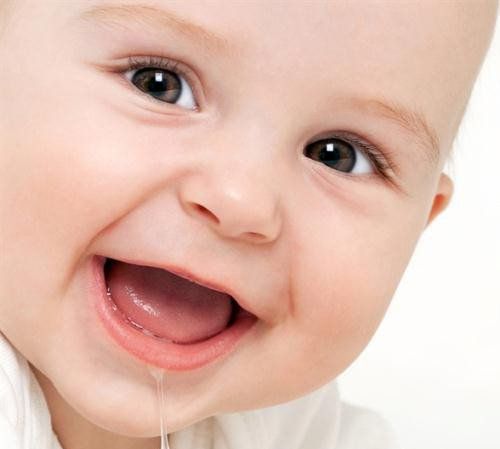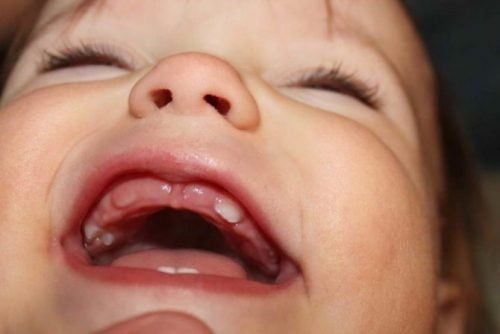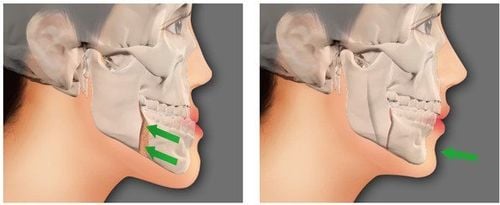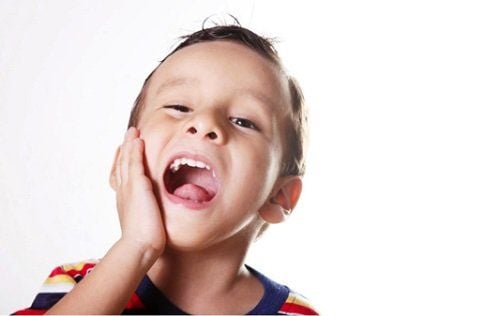This is an automatically translated article.
Teething is a sign of growth in the baby's body. The fact that the baby begins to grow the first milk teeth in life will cause discomfort, changes in the body's processes may cause the child to have a fever...
1. When do babies start teething?
Baby teething process can start from 3 to 12 months old. The time of teething for each child will be different. However, as a general rule, when your baby starts teething, about every 6 months will have about 4 teeth coming in. These first teeth are called primary or baby teeth, and they will eventually begin to be replaced by permanent adult teeth when your child is 6 to 12 years old.
Your baby's first tooth is likely to appear between 4 months and 7 months, maybe even as late as 12 to 14 months.

Chiếc răng đầu tiên của bé có khả năng xuất hiện từ 4 tháng đến 7 tháng
2. Baby's teething process
2.1 4-7 Months It's likely you'll notice the first teeth coming in when your baby is about 4 to 7 months old, and they can appear as late as 12 to 14 months.
“Which baby teeth come in first”. Usually, when a baby gets their first tooth, one of the lower front teeth comes in first or it is also known as the central incisor.
Teething symptoms can start as early as 3 months, so don't be surprised if the first tooth appears around this time.
2.2 8-12 Month Period Next are the top front teeth. These teeth are also called central incisors.
2.3 13-19 Months As soon as your baby turns 1 year old, you can expect the first molars to come in, most likely starting in the top part of the mouth.
2.4 16-23 month period At the age of teething from 16 to 23 months, the first canines will be erupting

Giai đoạn 16-23 tháng trẻ bắt đầu mọc răng nanh
2.5 Period 23-33 months When children are 2 - 3 years old, they will have all 20 primary teeth.
2.6 Loss of teeth between 6 and 12 years old When your child starts to lose teeth, usually baby teeth will fall out in the same order they came in. If your child's baby teeth come in later than their peers, they may also lose them later.
The middle teeth usually come in first (at 6 to 7 years old), then the lateral ones (7 to 8 years old). Molars can be lost at any time after that but are likely to fall out between 9 and 12 years. The bottom canines will likely fall out between 9 and 12 years, and the top canines will erupt in 10 to 12 years.
2.7 Completed teeth by age 13 Your child will probably have all 28 adult permanent teeth by around 13 years old (Four wisdom teeth will come in when she's 17 to 21 years old.)
If you have any concerns If you have any concerns about your child's teeth, talk to your child's dentist.
3. Taking care of teething babies
Remember that infants can chew even without teeth, and it is always important to be aware of the risk of choking and to supervise infants and young children while they are eating.
Cha mẹ luôn phải giảm sát trẻ khi chúng ăn để đề phòng mắc nghẹn
As soon as the first tooth begins to erupt, you can clean your child's teeth by:
Brush teeth at least 2 times a day, especially after meals Use a clean finger to gently rub baby's gums for about 2 minutes. Do not give your baby milk or juice while sleeping. This can easily damage the enamel of your child's teeth. From the time the baby grows its first tooth and enters the weaning journey, mothers need to pay attention to proper oral hygiene for the child. After finishing each meal, the mother can give the child some water to help them clean their teeth.
In addition, parents should also apply some methods of changing habits and improving nutrition to support the child's teeth to develop better. Parents should supplement their children with supporting products containing lysine, essential micro-minerals and vitamins such as zinc, chromium, selenium, and B vitamins to help fully meet the nutritional needs of children. At the same time, these essential vitamins also support digestion, enhance nutrient absorption, help improve anorexia, and help children eat well.
Parents can learn more:
Signs of zinc deficiency in children
Micronutrient deficiency and failure to gain weight in children
Please regularly visit Vinmec.com website and update useful information to take care of your child. Take care of the baby and the whole family.
Reference source: babycenter.com












